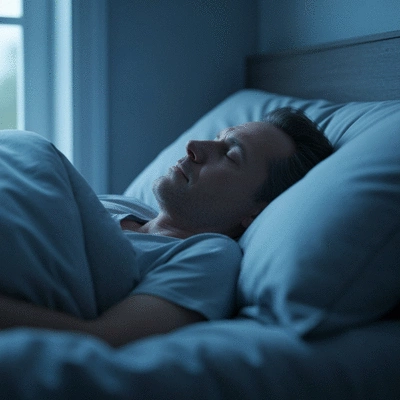Did you know that poor sleep quality can drastically impact your physical and mental health? Understanding insomnia is essential to reclaim your nights and enhance your days. Dive into the complexities of insomnia with us and discover actionable insights for better sleep.
What You Will Learn
- Insomnia can be classified into acute and chronic types, each requiring different approaches for management.
- Quality sleep is crucial for cognitive function, emotional stability, and overall health.
- Common causes of sleep deprivation include stress, poor sleep hygiene, and certain medical conditions.
- Natural remedies such as valerian root and mindfulness techniques can effectively improve sleep quality.
Insomnia Treatments: A Comparative Overview
Delve into the efficacy of various natural insomnia treatments, comparing their types and effectiveness for informed sleep management.
Valerian Root
Type: Herbal
Effectiveness: Moderate
Notes: May help with sleep onset, a gentle aid for relaxation.
Melatonin
Type: Hormonal
Effectiveness: High
Notes: Best for circadian rhythm issues; regulates sleep-wake cycles.
Mindfulness Meditation
Type: Technique
Effectiveness: High
Notes: Effective for reducing anxiety and promoting relaxation.
Chamomile
Type: Herbal
Effectiveness: Moderate
Notes: Gentle relaxant, often used in teas for calming effects.
Understanding Insomnia and Its Impact on Sleep Quality
Have you ever found yourself tossing and turning at night, unable to drift off into a peaceful sleep? If so, you're not alone. Insomnia is a common sleep disorder that can significantly affect your overall well-being. Understanding insomnia, its types, and its symptoms is the first step toward reclaiming restful nights and energetic days.
Insomnia can manifest in several forms, including acute insomnia, which lasts for a short period, and chronic insomnia, which can persist for months or even years. Common symptoms include difficulty falling asleep, staying asleep, or waking up too early. If any of this resonates with you, know that recognizing these symptoms is vital to addressing your sleep challenges effectively.
Defining Insomnia: Types and Symptoms
Understanding the various types of insomnia can help you tailor your approach to improving sleep. Here’s a quick breakdown:
- Acute Insomnia: Short-term sleep issues often triggered by stress or significant life changes.
- Chronic Insomnia: Ongoing sleep disturbances that can last for weeks or longer, often requiring more structured intervention.
- Onset Insomnia: Difficulty falling asleep at the beginning of the night.
- Maintenance Insomnia: Trouble staying asleep or waking up too early.
Recognizing which type you may be facing is crucial for finding effective solutions. At Sleep Well Insights, we aim to demystify these experiences and empower you with knowledge.
The Role of Sleep Quality in Overall Health
Did you know that sleep quality is interconnected with your physical and mental health? Poor sleep can lead to various issues, such as reduced cognitive function, increased stress levels, and even a weakened immune system. Cultivating a good night's sleep is essential for maintaining a balanced life.
Here are some key reasons why quality sleep matters:
- Enhances memory and learning.
- Boosts mood and emotional stability.
- Supports immune function.
- Promotes healthy metabolism and weight management.
By prioritizing sleep, you pave the way for a healthier, happier you! It's all about taking those small steps toward better sleep hygiene and understanding the impact of insomnia.
Common Causes of Sleep Deprivation and Its Effects
Now that we've established what insomnia is and its importance, let’s explore common causes of sleep deprivation. It's vital to identify these factors to tackle them effectively.
- Stress and Anxiety: Often, racing thoughts keep us awake, making it hard to relax.
- Poor Sleep Hygiene: Activities like using screens before bed can disrupt our natural sleep patterns.
- Medical Conditions: Chronic pain, respiratory issues, and hormonal changes can lead to sleepless nights.
- Medications: Some prescriptions can interfere with the sleep cycle.
Recognizing these causes is the first step toward addressing them. By understanding what may be keeping you awake, you can take active steps to create a more restful sleeping environment and a comprehensive sleep strategy.

Interactive Poll: Your Sleep Journey
We want to hear from you! What has been your biggest challenge when it comes to getting a good night's sleep? Choose one option below:
Summarizing Natural Treatments and Their Scientific Backing
As we explore the world of insomnia, it's clear that natural treatments can play a significant role in improving sleep quality. From herbal supplements to lifestyle changes, there’s a wealth of options available to support your sleep journey. In this section, I’ll share some key takeaways on natural remedies, highlighting their efficacy based on scientific research.
Natural remedies such as valerian root and melatonin have shown promise in various studies, suggesting that they might help alleviate symptoms of insomnia. However, it’s essential to approach these treatments with an understanding of their benefits and limitations.
Key Takeaways on Natural Remedies for Insomnia
- Herbal Supplements: Valerian root and chamomile have been widely acknowledged for their calming properties. For more insights into natural remedies, you can explore resources like the National Council on Aging's article on natural sleep remedies.
- Melatonin: This hormone is crucial for regulating sleep-wake cycles, especially in individuals experiencing circadian rhythm disturbances.
- Mindfulness Techniques: Practices like yoga and meditation can significantly contribute to reducing anxiety and promoting relaxation before bedtime.
- Dietary Considerations: Incorporating sleep-promoting foods, such as tart cherries and omega-3 fatty acids, may enhance sleep quality.
Each of these strategies offers unique benefits, and they often work best when combined. For instance, you might find that pairing a calming herbal tea with a relaxing mindfulness session creates a perfect pre-sleep routine! Remember, what works for one person may not work for another, so it's essential to experiment and find what suits your needs.
Future Directions: The Need for Continued Research
While we have a foundation of knowledge regarding natural treatments for insomnia, the field is ever-evolving. It’s crucial that we continue to support research efforts aimed at uncovering the full potential of these remedies. For instance, recent studies, like the one published on PMC NCBI, continue to shed light on the efficacy of various natural interventions. Scientific validation can help us understand the mechanisms behind these treatments and ensure they're both effective and safe.
Ongoing studies will not only enhance our understanding of existing treatments but also pave the way for new discoveries. As a community dedicated to sleep health at Sleep Well Insights, we’re committed to staying updated on the latest findings and sharing them with you. This ensures you're making informed decisions on your journey to better sleep! For a deeper dive into complementary and alternative medicine for insomnia, the EBSCO Research Starters provide valuable information.
Encouraging Informed Choices for Better Sleep
Deciding on the right treatment for insomnia can be overwhelming, especially with so many options available. It’s vital to equip yourself with the right information to make empowered choices. In this section, I’ll provide a comparison of some popular treatments, discuss the importance of consulting healthcare professionals, and highlight best practices for establishing a bedtime routine.
Deciding on the Right Treatment: A Comparison Table
| Treatment | Type | Effectiveness | Notes |
|---|---|---|---|
| Valerian Root | Herbal | Moderate | May help with sleep onset |
| Melatonin | Hormonal | High | Best for circadian rhythm issues |
| Mindfulness Meditation | Technique | High | Effective for reducing anxiety |
| Chamomile | Herbal | Moderate | Gentle relaxant |
This table provides a quick overview of various treatment options, helping you assess their potential benefits. Always consider your personal needs and preferences when making decisions.
Before starting any new treatment, I encourage you to consult with a healthcare professional. They can offer tailored advice that takes into account your individual health profile and any underlying conditions that may contribute to insomnia. Their guidance can be invaluable in finding a solution that works best for you!

Establishing a Bedtime Routine and Optimizing Sleep Environment
Creating a consistent bedtime routine can dramatically improve sleep quality. Here are some key elements to consider:
- Set a regular sleep schedule by going to bed and waking up at the same time each day.
- Create a relaxing pre-sleep ritual, such as reading or taking a warm bath.
- Optimize your sleep environment—ensure your bedroom is dark, quiet, and cool.
- Limit screen time before bed to reduce blue light exposure, which can interfere with melatonin production.
Establishing these practices can help your body recognize when it’s time to wind down, enhancing your chances of a restorative night's sleep. Let’s work together towards creating a peaceful sleep sanctuary that promotes rejuvenation and well-being!
Frequently Asked Questions (FAQs)
1. What are the main types of insomnia?
Insomnia is primarily categorized into acute insomnia, which is short-term and often stress-induced, and chronic insomnia, which involves long-term sleep disturbances. There are also onset insomnia (difficulty falling asleep) and maintenance insomnia (difficulty staying asleep).
2. Why is quality sleep important for overall health?
Quality sleep is crucial for cognitive function, emotional stability, and overall physical health. It enhances memory and learning, boosts mood, supports immune function, and promotes healthy metabolism and weight management.
3. What are common causes of sleep deprivation?
Common causes include stress and anxiety, poor sleep hygiene (e.g., screen time before bed), underlying medical conditions such as chronic pain or respiratory issues, and certain medications that can interfere with the sleep cycle.
4. What natural remedies are effective for improving sleep quality?
Effective natural remedies include herbal supplements like valerian root and chamomile, melatonin (for circadian rhythm issues), mindfulness meditation techniques, and dietary considerations such as consuming sleep-promoting foods like tart cherries and omega-3 fatty acids.
5. How can I improve my bedtime routine and sleep environment?
To improve your bedtime routine, set a regular sleep schedule, create a relaxing pre-sleep ritual (e.g., reading or a warm bath), optimize your bedroom to be dark, quiet, and cool, and limit screen time before bed to minimize blue light exposure.
Recap of Key Points
Here is a quick recap of the important points discussed in the article:
- Insomnia can be categorized into types such as acute, chronic, onset, and maintenance, each requiring different approaches for management.
- Quality sleep is essential for overall health, impacting memory, mood, immune function, and metabolism.
- Common causes of sleep deprivation include stress, poor sleep hygiene, medical conditions, and certain medications.
- Natural remedies like valerian root, melatonin, and mindfulness techniques can enhance sleep quality when used effectively.
- Establishing a consistent bedtime routine and optimizing the sleep environment are crucial for improving sleep quality.









